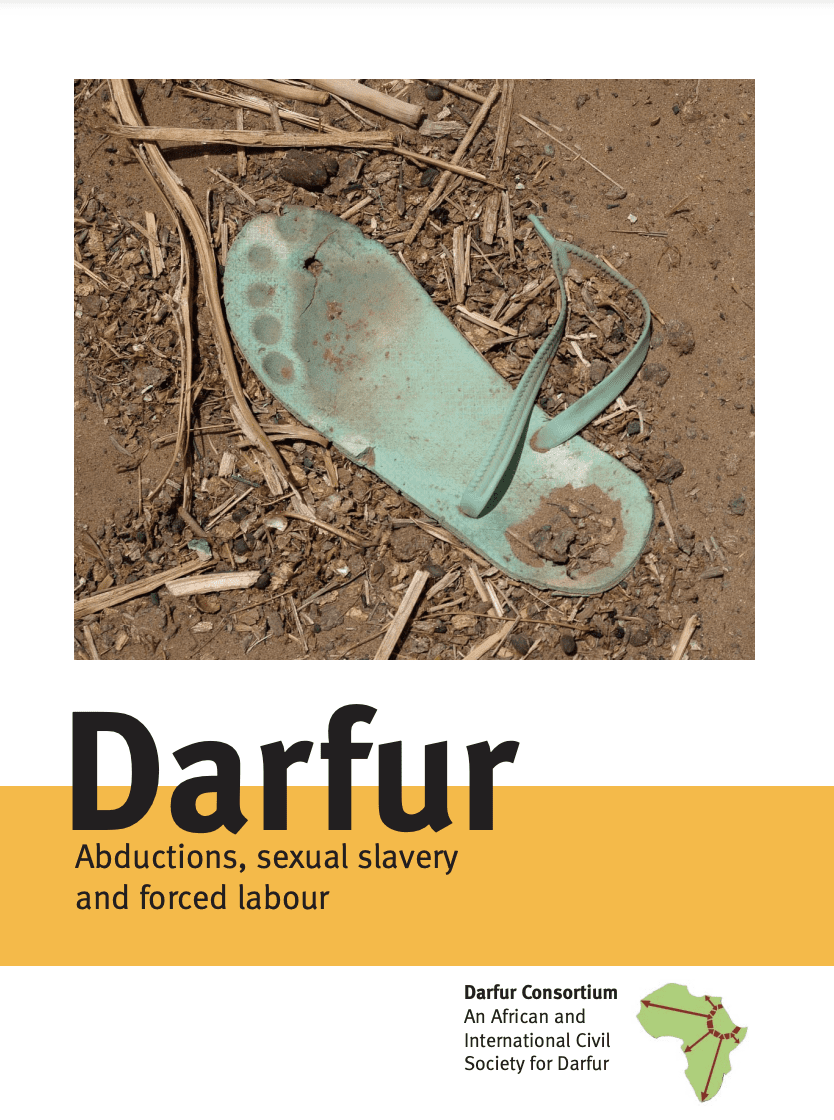
Abductions, sexual slavery and forced labour in Darfur
Research carried out by Darfur Consortium over the last two years, which included field research in three states of Darfur, has found that Government supported militia, like the Janjaweed and the Popular Defence Forces, together with the Sudanese Armed Forces, have systematically abducted civilians for the purposes of sexual slavery* and forced labour as part of the Darfur conflict.
The vast majority of those abducted are from nonArabic speaking ethnic groups like the Fur, Massaliet and Zagawa. Women and girls who are abducted are subjected to rape, forced marriage and sexual slavery as well as forced labour which typically would involve cooking, cleaning, washing clothes, collecting firewood and water, but may also include cultivating crops. Abducted men and boys are subject to forced labour which is usually agricultural work, looking after livestock, loading or carrying goods for their abductors and, in the case of boys, domestic work.
Evidence from victims or witnesses of abductions indicate that, at an absolute minimum, many hundreds of people have been abducted during the course of the conflict, but the true figure is likely to be in the thousands.
Abductions are used as part of a wider strategy in which civilians from non-Arabic speaking ethnic groups are attacked, killed and subjected to human rights violations in order to drive them from their land, which is then seized and repopulated by the militia and Arabic speaking nomadic groups. It is difficult to see how this could be described as anything other than ethnic cleansing.
The Government of Sudan has not only comprehensively failed in its duty to protect its citizens from abductions and associated abuses, but it also bears a direct responsibility for these violations as they have generally been carried out by Government forces or militias which the Government of Sudan established and supported.
Furthermore, the Government has denied that abductions are taking place in Darfur and has taken no action to hold those responsible to account. When former victims of abduction or their families report cases to the police they find the authorities show little interest in pursuing a prosecution even though the offence of abduction carries a penalty of up to ten years imprisonment under Sudanese law. There has not been a single successful conviction for any of the abductions and associated abuses carried out in Darfur.
The real tragedy of the situation in Darfur is how closely it follows the pattern of violations which took place during the civil war of 1983-2005 in southern Sudan. During this conflict, the Murahaleen militias carried out joint attacks with the Sudanese Armed Forces against civilians, committing widespread human rights violations and abducting some 14,000 people. Not one person was found guilty or punished for any of these abductions.
The report concludes that there is an urgent need to protect civilians from abductions and other serious human rights violations. It calls on the Government of Sudan to disarm and disband the Janjaweed, the Popular Defence Forces and other militia and to fully cooperate with the United Nations and the African Union in order to address continuing human rights and humanitarian issues in Darfur.
The mandate of the mixed UN and African Union force operating in Darfur (UNAMID) should be strengthened so that it can use force to protect civilians and the international community must provide the mission with the human and material resources to be able to do this effectively.
The Government of Sudan must establish confidence in the judicial system and end the impunity that those who have committed abduction and other human rights violations have enjoyed since 1983. This would include ensuring that all those responsible for abductions are prosecuted, punished and prohibited from holding public positions in the future and that those who have failed to properly investigate or sanction abductions are punished and, where appropriate, removed from jobs. The Government also needs to bring its national laws and policies in line with its obligations under the Interim National Constitution and the international human rights standards it has ratified.
Read more here.
